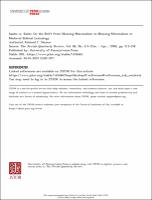Please use this identifier to cite or link to this item:
https://hdl.handle.net/20.500.12202/4319Full metadata record
| DC Field | Value | Language |
|---|---|---|
| dc.contributor.author | Steiner, Richard C | - |
| dc.date.accessioned | 2019-01-30T23:12:19Z | - |
| dc.date.available | 2019-01-30T23:12:19Z | - |
| dc.date.issued | 1998-01 | - |
| dc.identifier.citation | Steiner, Richard C. (Jan-Apr 1998). Saadia vs. Rashi: On the Shift from Meaning-Maximalism to Meaning-Minimalism in Medieval Biblical Lexicology. Jewish Quarterly Review. 88(3/4): 213-258. | en_US |
| dc.identifier.issn | 0021-6682 | - |
| dc.identifier.uri | https://yulib002.mc.yu.edu/login?url=http://dx.doi.org/10.2307/1454663 | en_US |
| dc.identifier.uri | https://hdl.handle.net/20.500.12202/4319 | - |
| dc.description | This article is an expanded version of papers delivered at the Eleventh World Con- gress of Jewish Studies (Division A, Bible Plenary Session) on June 24, 1993; at the Institute for Advanced Studies of the Hebrew University of Jerusalem on November 16, 1994; and at the Israel Academic Center in Cairo on May 8, 1995. | en_US |
| dc.description.abstract | Saadia Gaon and Rashi held very different views concerning the task of the lexicographer. Saadia believed that the lexicographer must not limit himself to listing the common, well-attested meanings of a word; he has a duty to posit additional meanings as a means of resolving contradictions and producing smooth, coherent readings. Rashi felt that words have only one basic meaning from which all of the contextual meanings are derived, and that the task of the lexicographer is to find that meaning. Saadia's view was shaped by Muslim intellectual traditions. Rashi's view bears some resemblance to that of an anonymous 11th-century French speculative grammarian, but its roots are in rabbinic literature. Other exegetes cited in this article (the Masoretes, David al-Fāsī, Menaḥem ben Saruq, Jonah ibn Janāḥ, Joseph Qara, Abraham ibn Ezra, David Qimḥi, Joseph ibn Kaspi) have not been studied systematically, but the evidence gathered up to now suggests that the difference between Saadia Gaon and Rashi is part of a more general shift from meaning-maximalism to meaning-minimalism in medieval biblical lexicology--a shift which occurred independently in Spain and France. | en_US |
| dc.language.iso | en_US | en_US |
| dc.publisher | University of Pennsylavnia Press | en_US |
| dc.relation.ispartofseries | The Jewish Quarterly Review;88(3/4) | - |
| dc.rights | Attribution-NonCommercial-NoDerivs 3.0 United States | * |
| dc.rights.uri | http://creativecommons.org/licenses/by-nc-nd/3.0/us/ | * |
| dc.subject | ambiguity | en_US |
| dc.subject | verbs | en_US |
| dc.subject | Bible | en_US |
| dc.subject | homonyms | en_US |
| dc.subject | nouns | en_US |
| dc.subject | dictionaries | en_US |
| dc.subject | Torah | en_US |
| dc.title | Saadia vs. Rashi: On the Shift from Meaning-Maximalism to Meaning-Minimalism in Medieval Biblical Lexicology. | en_US |
| dc.type | Article | en_US |
| local.yu.facultypage | https://www.yu.edu/faculty/pages/steiner-richard | |
| Appears in Collections: | Bernard Revel Graduate School of Jewish Studies (BRGS): Faculty Publications | |
Files in This Item:
| File | Description | Size | Format | |
|---|---|---|---|---|
| Steiner_JQR Saadia OnTheShift GREEN 1454663.pdf | JQR GREEN PDF | 2.45 MB | Adobe PDF |  View/Open |
This item is licensed under a Creative Commons License

